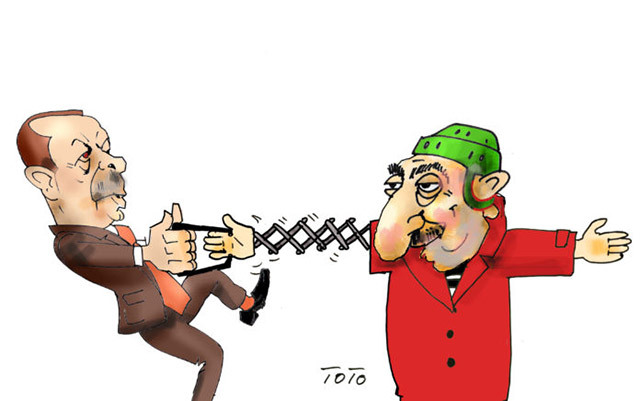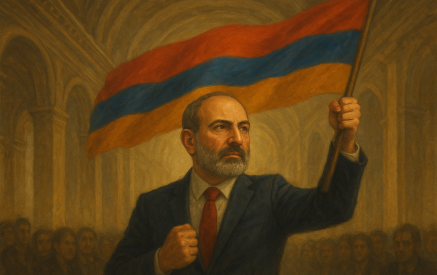by Edmond Y. Azadian
How far can President Recep Tayyip Erdogan push his demand for the Zangezur Corridor? On October 26 he was scheduled to head to Azerbaijan to attend the inauguration of an airport in Varanda, which was taken over by Azerbaijani forces during the 44-day war. Before his trip to Azerbaijan, Erdogan reiterated his idea of the corridor through Armenia’s sovereign territory, stating that Turkey has not changed its mind on the corridor issue.
“We are still determined on the opening of the corridor,” he said.
Read also
His soulmate, President Ilham Aliyev of Azerbaijan, who was threatening to open the corridor by force, has been quiet recently. He has even released five more Armenian POWs and the rumor is that more will be released by November.
These changes cannot take place without underlying reasons. There is a definite change in the political atmosphere: First, the issue of the corridor is no longer left to Armenia; it has become a global issue. Turkey wants the corridor as a component of its pan-Turanic plans, but now there are other regional players who are wary of Turkey’s expansionism. The corridor has become a red line for Iran, which has gone to the brink of war with Azerbaijan, and equally interested is India, as demonstrated by its more active presence in the region recently.
Another factor is the possible ill health of President Erdogan. Now his designated heir apparent, Minister of Defense Hulusi Akar, is cited in some news stories and credited with building up Turkey’s armed forces.
Unlike its forces, Turkey’s economy is faltering and the opposition has been accusing Erdogan of causing the country’s economic decline through his expensive foreign adventures.
In addition, the standoff continues between Turkey and the US over the F-35 fighter planes.
Another reason for the atmospheric change is the 3+3 negotiation format is losing its momentum. That format was being promoted by Turkey and Russia. The idea was to solve the regional problems with the participation of Russia, Turkey and Iran plus Armenia, Azerbaijan and Georgia.
During a recent trip to Georgia, US Secretary of Defense Lloyd Austin, blasted that format, stating that before talking about the 3+3 format, Russia has to return the occupied territories it has claimed back to Georgia. Armenia’s Secretary of Security Council Armen Grigoryan made a reserved statement that his country had been studying the format, and it was too early for Armenia to comment, because that format is designed to keep the West away from getting involved in the Caucasus.
Additionally, no member in that 3+3 format had supported a settling of the status of Karabakh through negotiations. Then, suddenly we see Russia back off from the plan; Maria Zakharova, the spokesperson for the Russian Foreign Ministry, started saying that the idea of the format did not originate in Moscow but was proposed by Turkey and Azerbaijan and Russia simply went along with it.
All these activities indicate that there is a tug-of-war between the parties to deny the West from participating in the resolution of the conflicts in the region. Most probably this infighting is the reason for the delay in convening the meetings of the Organization for Security and Cooperation in Europe (OSCE) Minsk group, on which rests Armenia’s last hope to bring to the negotiation table the issue of the status of Karabakh.
While the above activities are evolving, a symbolic date has been chosen to sign two agreements. That date is November 9, the first anniversary of the signing of the ceasefire declaration. The agreements will be signed by President Vladimir Putin of Russia and Aliyev, as well as Prime Minister Nikol Pashinyan.
The first agreement is on the border demarcation and delimitation between Armenia and Azerbaijan, based on the old USSR maps. The second agreement is opening the roads and communications; the latter was being negotiated by the deputy prime ministers of the three nations.
Both treaties have their potential dangers. We have to find out if the agreement on recognizing each other’s territorial integrity contains any reference to Karabakh, as President Aliyev was insisting all along that Armenia has to accept Karabakh as part of Azerbaijan. The caveat in the second agreement is the issue of the corridor.
Caution in these cases is warranted as President Putin has just made a convoluted statement asking for concessions from both parties, saying, “There are things which require mutual concessions. There are places where exchanges are required.”
The sad truth is Armenia has no room for further concessions after losing 75 percent of Karabakh and after compromising the security of its very own borders.
In the meantime, documents are being released about the war and Azerbaijani victims in that war.
The Baku authorities, thus far, have admitted to have suffered 2,700 casualties. But former Prime Minister Hrant Bagratyan insists that the losses on the Azerbaijani side far exceed 18,000 and he quotes a site in Holland and also the news of the opposition media. Indeed, the opposition representatives in Azerbaijan have been visiting the cemeteries and counting flags on fresh graves. Bagratyan also believes that Azerbaijan and Turkey did not have enough fighters left to take over Shushi, which was offered to them by Russia on a silver platter.
If indeed Azerbaijan suffered three times more casualties than Armenia, that is not a cause for consolation. But that indeed indicates that the Armenian army lived up to its reputation as a formidable fighting force in the Caucasus.
To continue the war against overwhelming forces for 44 days and to face deadly new warfare technology is no small feat. Some divisions in the Armenian army were victims of confusion; the rest stood up and fought valiantly.
Military wisdom suggests that the standard ratio of losses in warfare is that the aggressor absorbs three times more casualties than the party defending itself. Viewed through the prism of that ratio, Bagratyan’s statement might actually be realistic.
A tenuous situation continues. Shootings are taking place regularly and the Armenian side is losing many servicemen and civilians but the Russian peacekeeping forces seem to have orders not to defend the Armenian side. If recent news is accurate, that Armenian forces have been facing the Azerbaijani forces both on Armenia’s borders and in Karabakh, whereas the Russian peacekeepers are positioned behind the Armenian forces rather than between the two armies.
No one believes that the Russian forces are there to keep peace, but President Putin himself and Foreign Minister Sergey Lavrov have been harping on what a wonderful job the peacekeepers are doing.
For a long time, Russia was looking for an opportunity to bring its military on Azerbaijani soil. The 44-day war gave that opportunity to Moscow. The organized swiftness of that operation indicates that Russia was always ready for that move.
The question lingers in the minds of the Armenians: what will happen if Azerbaijan asks Moscow to move its peacekeepers out? Incidentally Baku has not even signed the agreement which has allowed the Russian peacekeepers in, so as to maintain its option to refuse Russian military presence on its soil.
Armenia and the diaspora have been allocating their resources toward what is left of Karabakh. The resettlement of the displaced refugees is a tremendous task, but it is a necessary project to keep Armenians in Karabakh. However, Russia has other ideas. Moscow’s insistence that the issue of Karabakh’s status should not be raised at this time has very serious implications.
Russia has a pattern of operating in the “near abroad.” Before wresting South Ossetia and Abkhazia from Georgia, Moscow granted citizenship to many residents of these two provinces. Later on, it had an excuse to defend its citizens by occupying their land.
A similar policy is being applied in Karabakh: Russian citizenship is being distributed and the Russian language is being taught on the same level as Armenian.
When push comes to shove, Russia will again play the game as a defender of its and stay put in Karabakh. For the Karabakh people that will become an acceptable situation when all hope for independence or autonomy are dashed.
Before the current process goes too far, the OSCE session must convene and take up the issue of the status of Karabakh.
Time is running out and time is against the destiny of Karabakh and its people.


























































